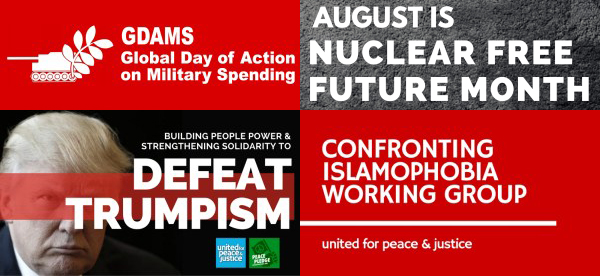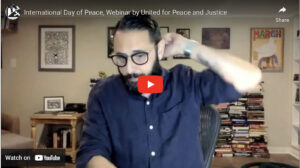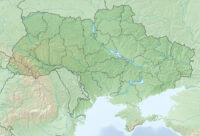As 2016 ends, UFPJ looks back on a year of educating, organizing and protest that included our
presence at Standing Rock, participation in the Iraq Tribunal, challenging weapons sales to the
Saudi government, protesting both presidential candidates, raising the alarm about the growing
danger of wars among nuclear-armed states, and promoting the Global Days of Action on Military Spending.
Noam Chomsky Signs and Endorses the Peace Pledge by UFPJ
Tomorrow (11/2), United for Peace and Justice is meeting in Times Square, New York City at 2pm, at the Army Recruiting Station to march and HAND DELIVER the Peace Pledge to the Campaign HQs of Donald J. Trump and Hillary Clinton.Join the action: Say No to WW3! NYC Protest Trump & Clinton on War & MilitarismNoam Chomsky has signed and endorsed the Peace Pledge by UFPJ.Take the #PeacePledge here: http://peacepledge.unitedforpeace.org/
Posted by United for Peace and Justice on Tuesday, November 1, 2016

But the future demands greater activism, which is why UFPJ launched the Peace Pledge
Campaign in October 2016. This campaign will carry over into 2017 with vigils, teach-ins,
protests, demonstrations, and nonviolent civil disobedience. The threats we face are grave. The
Iran Nuclear Deal – a huge success of 2015 – is now in jeopardy. Anti-immigrant sentiment and
attacks on Muslims are on the rise. Climate change deniers are taking the reins of power. Trump
and his cronies spread racism and misogyny, while militarized police forces tyrannize African-
American and Native-American communities.
Yet there are signs that popular pressure for peace and justice is also rising, and UFPJ is working
to organize now, in preparation for national mobilization. We are facilitating partnerships to build a “Movement of Movements” to challenge the forces of hatred, violence, war, privilege, and injustice. Since the election, UFPJ has been convening a series of national conference calls with an ever-growing number of peace and justice leaders and activists. We are discussing strategies and tactics, and building a calendar of planned protests, marches, and actions – now, at the Inauguration, during Trump’s First 100 Days, and beyond.
Amid all the dreadful post-election news, Standing Rock and support for Native American-led
opposition to the Dakota Access Pipeline have been a harbinger of the people’s movement for
peace and justice we must build to challenge the turn to the right we are seeing in the U.S. and
across much of Europe. UFPJ’s Communications and Organizing Coordinator, Matt DeVlieger (our
only paid staff), and many of our member organizations have been present near the Oceti Sakowin Camp. They have been inspired by the peaceful and prayerful gathering, and by living with awareness that “Water is Life!” Hundreds of people signed up for UFPJ’s recent briefing call about Standing Rock and how to support those on the frontlines. We are cautiously optimistic about the U.S. Army Corps of Engineers’ decision not to grant an easement allowing the pipeline to cross under Lake Oahe – but we must and will work to sustain this victory.
UFPJ will stand in solidarity with the protests at Standing Rock and elsewhere as the struggles for
indigenous peoples, water, and the future of our planet continue. There are other pipelines and
other communities under militarized occupation at home and around the globe. We will build
upon the momentum generated by Standing Rock and let it unite us in seeking dignity, health, life, and justice for communities everywhere.
The peace movement saw other successes in 2016, notably in elevating Saudi Arabia’s violations
of human rights and international humanitarian law in Yemen to national and international
attention. UFPJ co-sponsored the March 2016 “Summit on Saudi Arabia: Understanding the Kingdom and its Global Role,” organized by CODEPINK. The Saudi’s indiscriminate bombing and
shelling of Yemeni civilians led to serious efforts to limit arms sales to Saudi Arabia in the U.S. and the U.K., a struggle we must continue and win.
When Obama became the first sitting U.S. President to announce his plans to visit Hiroshima, UFPJ delivered a letter signed by 1,500 individuals insisting that he back up his disarmament rhetoric with meaningful action, and that he meet with survivors of the atomic bombs dropped by the U.S. on Hiroshima and Nagasaki. Despite pre-visit assertions that he would not have time for such a meeting, Obama did ultimately speak with two hibakusha (A-bomb survivors), after laying a wreath at Hiroshima & Peace Memorial Park. But President Obama, who in 2009 committed the U.S. to “seek the peace and security of a world without nuclear weapons,” has a dismal record of nuclear disarmament. He has endorsed plans to spend $1 trillion over the next three decades to modernize the U.S. nuclear arsenal.
Opposing this policy is the focus of UFPJ’s Nuclear Disarmament and Redefining Security
Working Group. Each August, the Working Group sponsors “Nuclear-Free- Future Month” to build support for the abolition of nuclear weapons and energy. This year’s activities included a dynamic briefing call on “The Imperative of Nuclear Disarmament & New Priorities in an Increasingly Dangerous World”. This fall the majority of the world’s nations voted in the UN General Assembly to commence negotiations in 2017 on a treaty to outlaw nuclear weapons, a historic development, barely noted in the media. But the U.S., Russia, Britain and France vociferously opposed the resolution, and all indications are that the nuclear-armed states will not participate in the negotiations. UFPJ will continue in 2017 to raise awareness about increasing nuclear dangers, as well as the growing global demand for nuclear abolition. UFPJ National Co-convener Jackie Cabasso serves as North American Coordinator for Mayors for Peace, a worldwide organization of 7,196 cities in 162 countries working for the elimination of nuclear weapons. Mayors for Peace (www.mayorsforpeace.org) is a vital UFPJ partner.
UFPJ’s new Confronting Islamophobia Working Group includes Muslim-American activists, labor organizers, anti-violence trainers, and community organizers who are collaborating on developing trainings and materials to counter violence and hate crimes directed against Muslims and Muslim communities in the U.S. The group will be sharing information about trainings and will be organizing opposition to any and all efforts to create a “Muslim Registry,” re-create Congressional committees on “un-American activities,” or target Muslims in the U.S. with
surveillance.
UFPJ’s Legislative Action Network keeps our member organizations and individual activists
informed about bills before Congress and local legislatures. Most importantly, we advocate against military spending and promote spending on education, healthcare and other human needs, and efforts to address climate change. Total military spending in the FY 2017 budget will top $620
billion (for the Pentagon, nuclear weapons, and aid to foreign armies). Endless wars have cost
millions of lives and trillions of dollars, while the needs of growing numbers of Americans go
unmet. Europe is overwhelmed by the largest refugee crisis since World War II, while the UN begs for a mere $550 million to aid refugees who are the victims of these wars. Corporate interests of U.S. weapons manufactures are driving the insane, upward spiral of the military budget. We will
ratchet up our opposition with more powerful lobbying, through protest and nonviolent direct
action during the April 2017 Global Days of Action on Military Spending, and by organizing where
we live to affirm the rights and humanity of all individuals, and demand that human and
environmental needs receive the funding they require.
UFPJ is grounded in opposition to the endless, ongoing wars that wax and wane throughout the
Middle East. Though there are fewer U.S. “boots on the ground,” the U.S. is bombing and has
launched drone attacks in Afghanistan, Iraq, Syria, Yemen, Somalia, Pakistan, and Libya.
Recognizing that the war in Syria is one of the most complex wars in history, and that there are
deep divisions within the peace movement about how to address it, in September UFPJ organized a national briefing call, “The many Wars of Syria,” with Middle East expert, Phyllis Bennis.
We didn’t anticipate a Trump Presidency when 2016 began, but UFPJ was present at events and
forums throughout the U.S. and the world, working to lay the groundwork for a revitalized peace
and justice movement. We were at the Left Forum in New York City in May, hosting panels and
presentations on Cutting Military Spending, and tackling Forever War and the Nuclear/NATO
Threat. We co-sponsored the “No War 2016: Real Security Without Terrorism” conference in
September in Washington, DC and the December “People’s Tribunal on the Iraq War”, which
focused on the lies behind and the costs of that misbegotten war. Jackie Cabasso and
representatives from several UFPJ member organizations spoke at the International Peace
Bureau’s 2016 Congress in Berlin in October. Matt DeVlieger participated in the “No to NATO/No
to War,” NATO counter-summit in Warsaw in July. UFPJ’s other National Co-convener, Terry
Rockefeller, presented at the World Social Forum in Montreal in August.
UFPJ led and supported protest throughout 2016. In the run up to the election, we organized an
antiwar march from the Times Square Army Recruiting Station to Trump and Clinton Campaign
Headquarters, a peace rally at Hofstra University preceding the first Presidential debate, and local actions to coincide with the Democratic and Republican conventions in Philadelphia and
Cleveland. UFPJ supported the Close the School of the Americas/Resist Militarization protests at
Fort Benning; Democracy Awakening – get big money out of politics; Democracy Spring in DC and nationwide; protests against Saudi aggression against Yemen in New York City; and #ReclaimMLK – in support of the Movement for Black Lives, nationwide.
Throughout 2016, UFPJ strived to build and maintain a network of relationships that will serve as
a basis to build on in these newly challenging times. UFPJ has the vitally important power to
convene national peace and justice leaders with local groups, which are once again becoming
active. We published over 100 events on our calendar this year to assist members groups and
allies in their programming. We are working to build bridges across more issues and to unite
activists working on a wider variety of issues, so that the forces for justice, equality, dignity,
nonviolence, inclusion, and the wellbeing of our planet are aligned to confront the challenges of
2017.
Please visit our website for UFPJ action alerts, statements, recordings of briefing calls, sign on
letters, petitions, reports and other resources.




